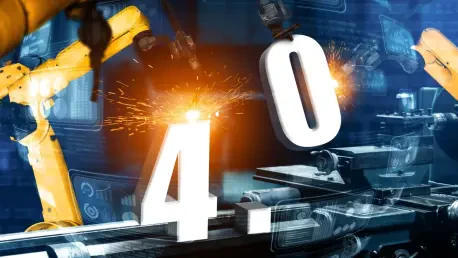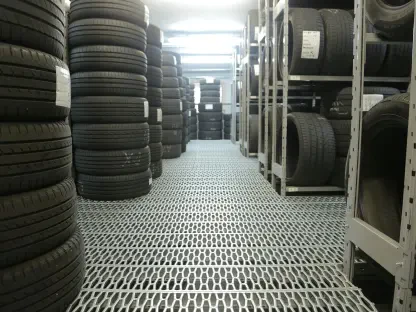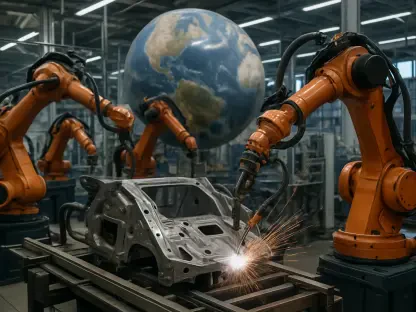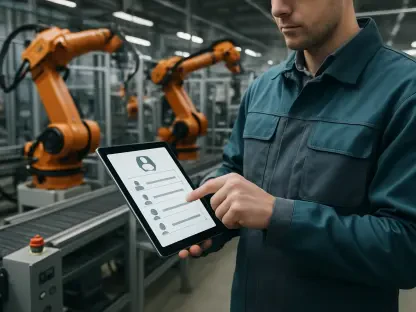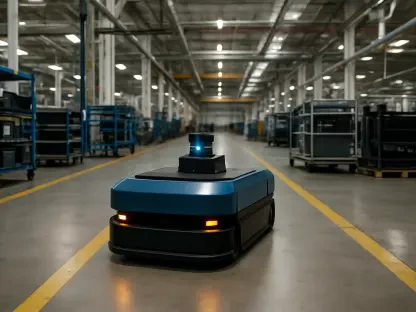Vietnam is amid a digital transformation that promises to reshape its economic and social infrastructure, urging intellectuals, especially those in science and technology, to spearhead change and innovation. The driving force behind this transition is Politburo Resolution No. 57-NQ/TW, a strategic plan that highlights the critical role of technology and science in advancing national development. The resolution fosters creativity, encourages innovation, and aims to integrate Vietnam more deeply into international scientific and technological value chains. As the country embarks on this journey towards Industry 4.0, its intellectual community becomes indispensable in its efforts to achieve milestones in digital economy and smart city development.
Strengthening the Role of Intellectuals
Critical Need for Scientific and Technological Leadership
Industry 4.0 signifies a profound transformation where Vietnam’s intellectuals are expected to take the helm, guiding the country through a technological revolution that encompasses advanced computing systems, digital manufacturing, integrated data analytics, and automated processes. These elements form the backbone of a modernized economic framework. Intellectuals, who constitute approximately 90% of Vietnam’s intellectual cohort, are poised to drive these changes by engaging deeply in scientific research, innovation, and technological application. The scientific community views the resolution’s initiatives as opportunities to reshape Vietnam’s development strategies, aligning intellectual capabilities with national goals to foster sustainable economic growth.
Dr. Pham Van Tan, a notable figure with his past role in the Vietnam Union of Science and Technology Associations (VUSTA), emphasizes the transformative power of science and technology intellectuals. He underscores the need for reforming operational mechanisms within intellectual associations, advancing them from traditional structures into dynamic entities acting as advisory bodies for the Party and State. These reformed associations are expected to provide critical policy analysis and propose groundbreaking solutions, particularly in fields like digital infrastructure, smart city planning, and new technology innovation. To further strengthen their role, collaboration across various sectors is essential, involving coordinated efforts from ministries, local agencies, and social organizations to ensure comprehensive implementation of the resolution.
Raising Awareness and Fostering High-Quality Human Resources
A pivotal aspect of executing Industry 4.0 is enhancing awareness among scientists and developing high-quality human resources who can effectively navigate new technological landscapes. VUSTA holds the responsibility to lead efforts in aligning intellectual efforts with national digital transformation goals. By actively collaborating with other agencies, VUSTA endeavors to facilitate breakthroughs in scientific thought and technological activities within businesses. This involves encouraging participation in scientific alliances, fostering environments conducive to innovation, and developing intellectual clubs that promote technological advancement.
Furthermore, the support for intellectual activities requires assessment and enhancement of existing policies and mechanisms that motivate creativity and contribution by intellectuals. Dr. Le Xuan Rao emphasizes the need for raising awareness to promote unity and understanding among the intelligentsia. By creating enabling environments for scientific innovation, Vietnam can attract renowned experts and leverage their expertise to boost technological progress. Implementing supportive measures and developing legal frameworks, such as the Law on Science and Technology and Innovation, plays a crucial role in enabling effective collaboration between government entities and intellectual organizations, ensuring smooth execution of policy-driven actions that benefit the broader intellectual community.
Supporting Mechanisms for Intellectuals
Strategies for Research and Commercialization
To propel the commercialization of science and technology products, Dr. Le Xuan Rao suggests establishing research support funds that focus not only on technological transfers but also offer keen policy analyses. This approach allows VUSTA to provide valuable assistance through funding initiatives that boost advisory and analytical capabilities. Successfully navigating technological commercialization requires strategic planning and execution of pilot programs aimed at fostering high-impact research, ultimately driving economic growth and industry innovation. Encouraging effective scientific research and providing necessary resources ensures that technology transfer processes are seamless and support national digital ambitions.
Dr. Rao’s insights highlight the significance of enhancing intellectual contributions to scientific endeavors by facilitating collaboration and leveraging advanced technology as a critical motivator. This involves fostering a culture of innovation where businesses actively engage with intellectual clubs and scientific organizations to access groundbreaking technologies. A collaborative approach that integrates various stakeholders, including politicians, entrepreneurs, and academics, maximizes the developmental potential of research outputs. Encouraging businesses to partner with intellectuals allows Vietnam to explore new technological possibilities, fostering sustainable advancement through commercialization and technological application.
Engaging Overseas Vietnamese Intellectuals
Another crucial strategic component to support Vietnam’s Industry 4.0 transformation involves engaging overseas Vietnamese intelligentsia and professionals from international organizations. Dr. Rao advocates for tapping into the expertise of expatriate intellectuals who are potential rapid adopters of new technologies and play vital roles in assisting Vietnam’s integration into global scientific value chains. By leveraging their knowledge and experience, Vietnam can enhance its competitive edge on the international stage, adopting innovative practices that align with global technological standards.
The growing interconnectedness in scientific communities worldwide presents significant opportunities for cooperation and knowledge sharing. By facilitating platforms that invite contributions from overseas experts, Vietnam fosters a global collaboration that enriches domestic intellectual capabilities. This integration ensures that overseas professionals can contribute meaningfully to national agendas, offering crucial insights and developing strategies that bridge knowledge gaps. Harnessing the talents of worldwide Vietnamese scientists and integrating them into domestic projects enhances Vietnam’s progression toward becoming a key player in the industry 4.0 era.
Ensuring Intellectual Resources for Sustainable Growth
Revisiting VUSTA’s Operational Model
Dr. Pham Van Tan emphasizes the necessity to revisit VUSTA’s operational model to better adapt to the evolving business and market landscape that Industry 4.0 demands. This calls for an expansion of its self-managed organizational model and autonomous mechanisms to actively engage and collaborate with the market, society, and businesses as core partners. Dr. Tan advocates centralizing these aspects to extract maximum societal and business benefit, utilizing the scientific and technological potential of intellectuals in real-world applications. By strategically aligning these partners, VUSTA can increase productivity, support innovative projects, and contribute to national growth agendas.
To capitalize on this strategic shift, Dr. Tan proposes the establishment of think tanks under VUSTA’s management. These entities would provide expert consulting across various domains, enabling governmental agencies and businesses to leverage scientific and technical expertise in decision-making processes. By adhering to supply-demand and market mechanisms, the think tanks aim to optimize intellectual resources, ensuring their efficient application. Examples such as the Vietnam Seed Trade Association and the Vietnam Thermal Science and Technology Association highlight successful consultancy practices, demonstrating substantial savings and value through expert knowledge application.
Challenges and Solutions for Engaging Older Intellectuals
While progressive strides towards implementing Industry 4.0 are underway, Dr. Pham Ngoc Son sheds light on challenges faced by VUSTA’s veteran intellectuals, primarily retired scientists. Despite possessing significant experience and knowledge, they confront hurdles like adapting to new trends, technologies, and engaging actively in scientific consultation and research tasks. To boost their participation, adjustments to the legal framework are necessary. This includes amending laws to better reflect the perspectives, tasks, and solutions required for proactive involvement by older scientists.
Ensuring older intellectuals remain active involves providing opportunities for consultation, fostering environments that encourage their participation, and acknowledging their contributions in scientific endeavors. By actively integrating these seasoned professionals into key projects influenced by ministries and relevant state agencies, Vietnam not only taps into their wealth of experience but also enhances the diversity and effectiveness of its intellectual community. Creating policies that facilitate seamless involvement of veteran intellectuals helps optimize their valuable scientific expertise, ensuring their voices remain influential in driving the digital transformation of Vietnam.
Strategic Pathways for Intellectual Contribution
Mobilizing National and Local Associations
A proactive approach for mobilizing intellectual resources is articulated by Dr. Phan Xuan Dung, highlighting VUSTA’s efforts to engage national industry associations, local unions, and scientific organizations to contribute actively to achieving national goals in science, technology, and digital transformation. This collaborative effort fosters diversity within Vietnam’s intellectual landscape, leveraging varied expertise across geographical representations. Such mobilization enriches the developmental trajectories envisioned by the government for Industry 4.0, ensuring comprehensive execution of strategic plans that involve every aspect of Vietnam’s social fabric.
Through coordinated actions and strategic alliances, VUSTA demonstrates its commitment to facilitating intellectualism and innovation across multiple layers of society. The collaborative framework encourages knowledge sharing, policy analyses, and technological exchanges, creating nurturing environments for scientists and technologists to thrive. By channeling resources and expertise from local organizations, Vietnam amplifies collective efforts towards its transformation agenda, ensuring robust contributions to the national quest for advancement in crucial sectors.
Investment in Education, Training, and Talent Attraction
Vietnam is currently undergoing a significant digital transformation, poised to reshape its economic and social foundations. This shift calls upon intellectuals, particularly those with expertise in science and technology, to lead the charge in driving change and fostering innovation. The catalyst for this transformation is the Politburo’s Resolution No. 57-NQ/TW. This strategic document underscores the vital importance of technology and science as key elements for propelling national growth and development. The resolution is designed to inspire creativity, stimulate innovation, and strategically position Vietnam within the broader sphere of international scientific and technological endeavors.
As Vietnam ventures into the realms of Industry 4.0, the contributions of the intellectual community become increasingly critical. Their involvement is essential for the nation to reach significant objectives in the realms of digital economy development and the creation of smart city infrastructures. This transformation represents a pivotal moment for Vietnam, one that requires a cohesive effort from its brightest minds to ensure the country not only keeps pace with global advancements but also establishes itself as a leader in various technological fields. Through active participation in global value chains, Vietnam aims to carve out a prominent position on the world stage, enhancing both its economy and social structures in the digital era.
